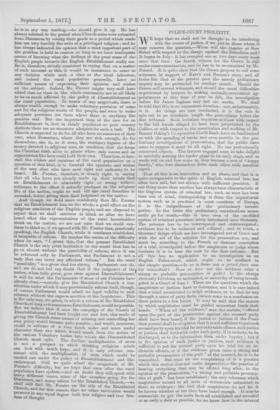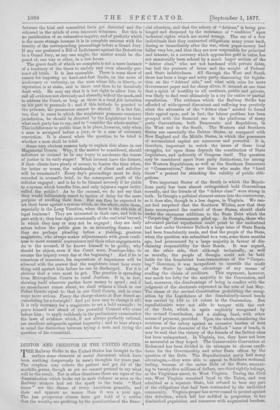POLICE-COURT PROLIXITY.
WE hope that we shall not be 'thought to he interfering with the course of justice, if we put to those whom it may concern the question,---When will the inquiry at Bow Street with 'reaped to the charge against the Detectives end ? It began in July ; it has occupied one or two days every week since that time ; the fourth witness for the Crown is still undertross-examination, and he has to be re-examined by Mr. Poland. It is quite clear that the Crown propose to call some witnesses in support of KUM'S and Benson's story, and all bodes fair that at the present pace the merely preliminary inquiry may be protracted for another month, Should the Crown call several witnesses, and should the usual difficulties experienced by lawyers in making mutually-convenient ap- pointments at this 'time of year be felt, the investigation
last six weeks, We shall before Sir James Ingham may
be told that this is no uncommon duration ; nor,.unfortunately, is it. As things arc mow conducted, it is the rule to spin out to an indefinite length the proceedings before the first tribunal. Such leviathan inquiries as those with respect to the bill frauds alleged to have been perpetrated by the Collies, or with respect to the constitution and working of Mr. Banner Oakley's Co-operative Credit Bank, have NO familiarised us with the spending of weeks and 'even .months in the pre- liminary investigations of prosecutions, that the public have come to suppose it must be all right. No one professionally concerned objects. The lawyers engaged seem to take delight in .carefully nursing the tender plant in its early stage, and as weeks Toll on and fees come in, they become a sort of "happy family," 'who tear themselves from each other with manifest regret.
That all this is an innovation and an abuse, and that it is ,quite antagonistic to the spirit of English criminal law, has often been said, but not always with sufficient precision. If one thing more than another has always been characteristic of the litigious system of criminal law, such as ours has been time out of mind, distinguishing it from the inquisitorial system such as is practised in most countries of Europe, it is the insignificance of the preliminary investi- gation. In the latter the preliminary examinations neces- sarily go for much,—this is true even of the modified system of criminal procedure lately introduced into Germany. The prisoner has to be interrogated and reinterrogated ; evidence has to be collected and collated ; and in truth, a thousand things which are here investigated out of Court and with the aid of the solicitor' for the prosecution are, and must be, according to the French or German conception of a trial, investigated before the magistrate or judge whose business it is to hear the case in the first instance. But all this has no application to an investigation in an English Police-court, which ought to be confined to the simple question,—Is or is there not a prima fissie case for committal ? Does or does not the evidence raise a strung or probable presumption of guilt ? Is the charge obviously frivolous, or unfounded, or unworthy ot being investi- gated in a Court of Law ? These are the questions which the magistrate or justices have to determine, and it is rare indeed that a mind accustomed to weigh evidence, or to find its way through a maze of petty facts, cannot come to a conclusion on these points in a few hours. It may be said that the statute by which magistrates meet be guided 'somewhat binds their hands. "When all the evidence," says the statute, "offered upon the part of the prosecution against the accused party shall have been heard, if the justice or justices of the Peace then present shall be of opinion that it is not sufficient to put such accused party upon his trial for any indictable offence, such justice or justices shall forthwith order such party, if in custody, to be discharged, as to the information then under inquiry ; but if in the opinion of such justice or Justices, such evidence is sufficient to put the accused party upon his trial for an in- dictable offence, or if the evidence given raise a strong and probable presumption of the guilt" of the accused, he io to be
committed. But what we are complaining of is a practice which this section does not make im.perative,—the practice of hearing everything that may be offered long after, in the
opinion of the prosecution, "a strong and probable presump- tion of guilt" has been established ; the 'easy tolerance which
magistrates extend to all sorts of .statements submitted to them as evidence ; the fact that magistrates do not let it be known whether or not they have heard enough. It may be reasonable to get the main facts all established and recorded at as early a date as possible, for we know how in the interval
between the trial and committal facts get distorted and dis- coloured in the minds of even innocent witnesses. But this is no justification of an exhaustive inquiry, and of prolixity which is the more strange because it is in complete contrast with the brevity of the corresponding proceedings before a Grand Jury. If any one preferred a Bill of Indictment against the Detectives to a Grand Jury, as any one might, the matter would be dis- posed of, one way or other, in a few hours. The grave fault of which we complain is not a mere instance of a tendency of the times to unduly and even absurdly pro- tract all trials. It is less excusable. There is some show of reason for imposing no hard-and-fast limits, on the score of irrelevancy or verbosity, on the man whose life, or liberty, or reputation is at stake, and is there and then to be decisively dealt with. He may say that it is but right to allow him to call all evidence not obviously and absurdly wide of the mark, and to address the Court, so long as there is a bond fide intention on his part to persuade it ; and if this latitude be granted to the prisoner, the prosecutor cannot be stinted. It is but fair, too, that in cases in which the magistrate possesses summary jurisdiction, he should be directed by the Legislature to hear what each party has to say, and to "consider the whole matter," This indifference to public time is in place, however, only when a man is arraigned before a jury, or in a case Of summary conviction. It is absurd when the question to be tried is whether a man shall be tried. Some very obvious reasons help to explain this abuse in our Magisterial Courts. Why, if the matter be considered, should solicitors or counsel be in any hurry to accelerate the course of justice in its early stages? What interest have the former, if their clients have plenty of money, to hasten the time when, for better or worse, the relationship of client and solicitor will be terminated? Every day's proceedings must be duly recorded in counsel's brief, to the consequent profit of the solicitor engaged ; and is he to be blamed severely if he yields to a system which benefits him, and only injures a vague entity called the public? As to the counsel, we do not say that they would deliberately resort to tactics of delay for the mere purpose of swelling their fees. But can they be expected to set their faces against a system which, on the whole, suits them, especially in the Long Vacation, when there is the ebb-tide of legal business? They are interested in their case, and loth to part with it; they lose sight occasionally of the real trial beyond, in which they may or may not be engaged ; they are daily actors before the public gaze in an interesting drama ; and they are perhaps pleading before a yielding, gracious magistrate, who always makes adjournments with great readi- ness to meet counsels' convenience and their other engagements, As to the accused, if he knows himself to be guilty, why should he object, even if the Court were, Penelope-like, to resume the inquiry every day at the beginning? And if he is conscious of innocence, his expressions of impatience will be silenced with the answer that the magistrate must hear every thing said against him before he can be discharged, yet it is obvious that a cure must be got. The practice is spreading from Metropolitan Courts to rural Justices. It is, in fact, showing itself wherever parties have money to spend ; and if no amendment comes about, we shall witness a block in our Police Courts equal to that in our Civil Courts, and in some ways more serious. Fancy the charge-sheets at Bow Street ac- cumulating for a fortnight And yet how easy to change it all It is only necessary for a magistrate to set a bold example ; to prove himself not afraid of the powerful Counsel who come before him ; to apply ruthlessly in the preliminary examination the laws of evidence which, if not always perfectly rational, are excellent safeguards against loquacity; and to bear always in mind the distinction between trying a man and trying the question of his committal.































 Previous page
Previous page